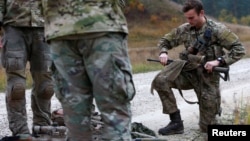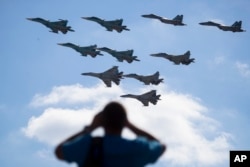The Danish government wants to increase its defense budget by 20 percent over the next five years in response to Russia stepping up military activity in eastern and northern Europe.
Much of the West has been troubled by Russia's actions since its 2014 annexation of Ukraine's Black Sea peninsula Crimea and its support for separatist rebels in eastern Ukraine in a war that has killed more than 10,000 people.
Baltic countries have grown increasingly alarmed.
Last year Russia, saying it was part of routine drills, moved ballistic nuclear-capable missiles to its enclave of Kaliningrad on the Baltic Sea and deployed its S-400 air missile defense system there. These missiles are capable of reaching Copenhagen.
Russia dismisses concerns over its defense activities and accused the West of "whipping up hysteria" over recent large-scale military exercises.
"Russia is investing heavily in its military and carrying out large-scale military exercises along the Baltic Sea and the Baltic countries' borders with disregard for international norms and principles," the government said in a statement on Tuesday.
It said its proposed 20-percent hike of the defense budget should be carried out gradually over a five-year period. The total increase would amount to 4.8 billion Danish crowns ($762 million) by 2023.
Under the plan, a new brigade of 4,000 soldiers that can operate independently, mainly in the Baltic and Nordic region, using anti-air missiles, battle tanks, artillery, and anti-submarine warfare equipment will be formed.
Danish military is currently operating along with U.S.-led coalitions in Iraq, Syria and Afghanistan. The proposal is a move to focus more on threats closer to home, Prime Minister Lars Lokke Rasmussen said at a press conference.
The proposal comes amid concerns in the Nordic and Baltic region over Russia's growing military strength.
In April, Denmark said Russia had hacked its defense computer network and gained access to employees' emails in 2015 and 2016.
The proposal will raise Denmark's defense spending to 1.3 percent of GDP in 2023, from 1.2 percent last year. NATO, to which Denmark belongs, requires its members to spend 2 percent of GDP on defense annually, though this is an informal target.
Denmark's defense spending has gradually dropped since 1988 when spending was above 2 percent of GDP, according to World Bank data.
Denmark's center-right minority government still needs to persuade a majority in parliament to approve a defense budget increase. Its main ally, the Danish People's Party, has said it wants more troops.






